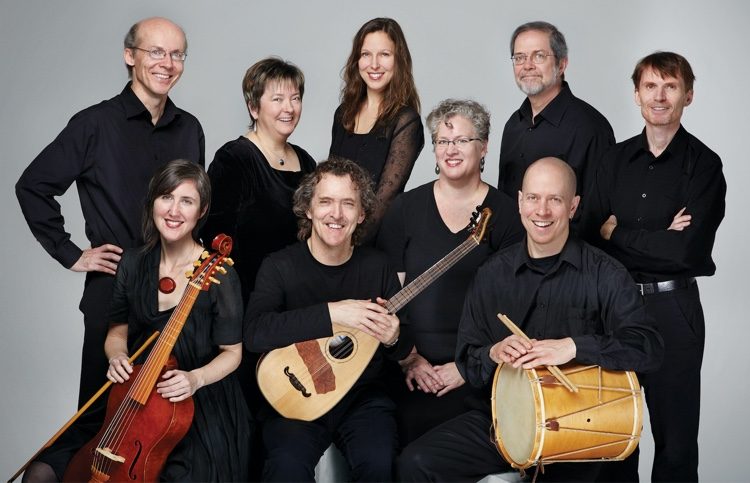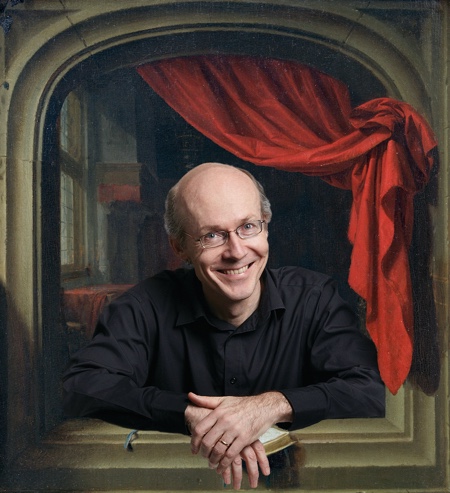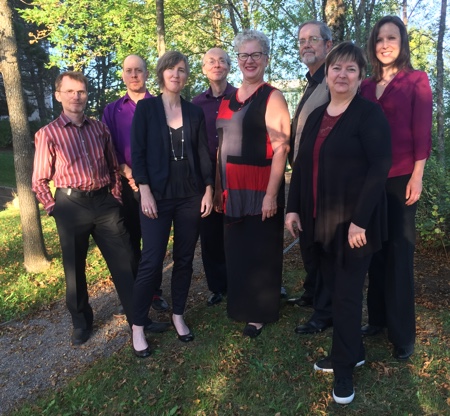
(Photo by Paul Orenstein)
By Colin Eatock
TORONTO — The Toronto Consort has been run so smoothly for so many years that the organization has tended to fly under the media’s radar. But in October, the organization made itself noticed when it announced that long-serving artistic director and tenor vocalist David Fallis would be stepping down at the end of the 2017-18 season (sort of). The directorship will be assumed by an eight-member group of artistic associates, including Fallis and many of the musicians who perform regularly with the nine-member ensemble. The Consort is set to become a consortium.

However, Fallis is quick to point out that in assuming this new model, the group is in fact returning to its roots. “The Toronto Consort was founded in 1972 by Timothy McGee,” he says, “who was a professor of musicology at the University of Toronto. It was a bold gesture, because there was nothing like it going in Toronto. It was before Tafelmusik, and early music was pretty spare in Canada. At that time, the group was run as it will be in the future — as an artistic collective.
“When I joined in 1979,” Fallis continues, “I was the ‘new boy,’ and I hardly knew anything about Medieval and Renaissance music. I wasn’t called ‘artistic director’ until 1990. In fact, I think it was the marketing people who came up with the designation.”
Now in his 60s, Fallis is a strikingly unpretentious man. Yet his modesty belies his accomplishments: in addition to his 38 years with the Consort, he is also music director of Toronto’s Opera Atelier, conducting the “period” opera company’s performances from the pit. He’s also conductor of Choir 21, a Toronto-based ensemble that specializes in contemporary music. And on top of all that, he’s an administrator, teacher, musicological researcher, and editor.
In his decades as artistic director of the Toronto Consort, Fallis has overseen an impressive expansion of the TC’s concert season. “When I joined,” he says, “we were doing three concerts a season, and we thought if we got 200 people in the audience we were doing well. Now we do five different programs, and each program is done two or three times. We also devote one of our programs to a guest ensemble. Our current hall seats 700, and sometimes we sell out.” Today, the Consort has an annual budget of about $500,000 Canadian.
Fallis gives two explanations for this growth. First, he points out that the Consort has presented an astonishingly broad body of repertoire. The ensemble’s “wheelhouse” is the late Middle Ages and Renaissance, but selections range from Gregorian chant to early baroque opera, as well as non-Western musics and even a few contemporary works.
“We’ve done music from the Codex Calixtinas,” he says, “from the 11th century — one of the first manuscripts that has two parts. Then we go up to about the middle of the 17th century. Cavalli’s Helen of Troy was first performed in 1651.”
The ensemble’s engagement with music outside Europe has led to collaborations with a Chinese pipa player, an Arabic oud performer, and singers and dancers from India. As for contemporary repertoire, Fallis is clearly proud of the Consort’s presentation, in February, of Wendake/Huronia by Toronto composer John Beckwith. (The piece is based on the French explorer Samuel de Champlain’s travels in what is now Ontario, in the 17th century, and his contact with native peoples.)
The other explanation Fallis offers for the Toronto Consort’s success has to do with the ensemble’s approach to audience-building. He notes that, unlike many other small early-music ensembles, the Consort’s business model is not founded on touring. There have been some tours, over the years — to New York’s Music Before 1800 series, the Madison Early Music Festival, and venues in Oregon and Washington State — but mostly, the group has stayed close to home, in Toronto, to build a loyal audience. “This leads to people feeling like they’re part of the ‘Toronto Consort family’ — and then they’ll give us money,” Fallis says with a laugh. “It sounds rather mercenary, but it’s true!”
Alison Melville, the Consort’s recorder and early-flute specialist, has noticed a strong sense of loyalty develop over the years. “People stop you in the street,” she says, “and say ‘I really enjoyed that concert you played in.’ And you’re going through your mental Rolodex to figure out which concert they’re talking about. It’s a real family feeling.”
So if things are going so well, why adopt a new model of artistic decision-making at this time? Is the Toronto Consort fixing something that isn’t broken? As Fallis explains, the decision to make a change in the artistic leadership was his own.

“I don’t feel that I’m quite as vocally reliable as I once was,” he says. “There are easy madrigals, and there are hard ones. I don’t want to just choose pieces that I can fit into. So I’ve decided I should step aside. We don’t need an artistic director who just sits in the hall during rehearsals and tells people what to do. It has to be someone who is part of the group. The artistic director has to be a performer as well.
“And I’m going out on a high note. This is our 45th anniversary. It’s going to be a wonderful year. We have a modest surplus, and the finances are in great shape. The board is strong, and the subscriber base is growing, and donations are growing. I’m going to stay as part of the team for a couple of years at least and see how it goes. I’ll put together a program or two a year, as seems appropriate.”
How, exactly, will the new model work? According to Melville, one of the new artistic associates, everyone will bring forward programming ideas. “But, she adds, “some people have more ideas than others. Sometimes two or more people will come together to plan a program. The idea of the group of us carrying on collaboratively can work, because we have strong people in the group who have skills besides singing and playing.
“We have library research skills, program-note writing, editing skills. It seems to me that this is something that can really work here. Sometimes if you have a group, you’ll have a couple who come forward with all the ideas. But this is a group where everyone is committed to doing things this way, and working things out.”
As for Fallis’ “retirement,” he doesn’t see himself slowing down much at all. “I’m still doing projects with Opera Atelier and Choir 21. In theory, there might even be a little more time for myself — if I learn now to say no.”
The Toronto Consort’s next program Dec. 8-10 at Trinity-St. Paul’s United Church in Toronto is “Navidad: A Spanish Christmas,” featuring Renaissance and Baroque music from the Spanish-speaking world. For information, go here.
Colin Eatock is a Toronto-based writer and composer.

